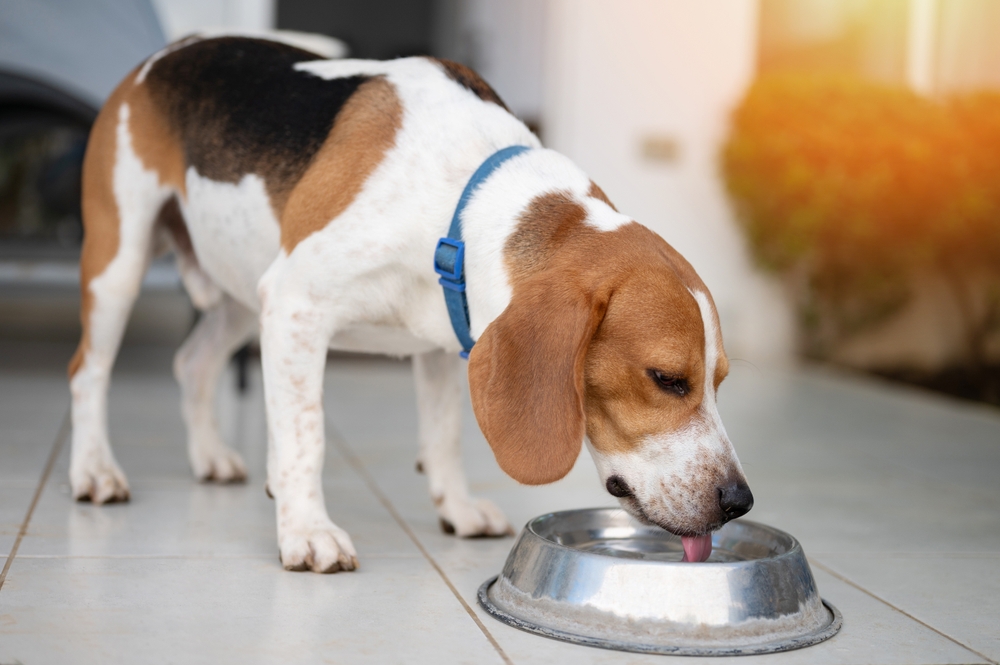So, your dog has a nice drink of water and then all of a sudden seems to bring it all back up. Or maybe you’ve just noticed foamy, watery puddles around the house. This is a very general sign and there are many possible causes.
Sometimes the issue is nothing to worry about if it only happens once or twice. Other times, your pooch will need to be seen by a vet for help. Read on to learn more about the possible causes of throwing up water, and how to know if your dog is vomiting or regurgitating.

Regurgitation Versus Vomiting: An Important Difference
The process of regurgitation occurs when food or water moves back up the esophagus of your dog into their mouth before it ever reaches the stomach.
Vomiting is the expulsion of the stomach contents accompanied by retching, abdominal heaving, and the reappearance of partially digested food and yellow bile.
Whether your pet is regurgitating or vomiting water will be a vital clue for your vet to help determine what is making your dog ill. Make a note of your pet’s symptoms and be prepared to provide your vet with as much information as possible.
When To Call the Vet
If you notice your dog drink and bring up a little water, but they seem otherwise well in themselves, you can monitor them for the rest of the day. However, if they continue to bring up water after drinking, you need to schedule a vet visit. If your dog is unable to keep water down, they will quickly become dehydrated, leading to even more problems.
You should also call the vet if your dog brings up water along with any of the following signs:
- Vomiting
- Diarrhea
- Poor appetite
- Lethargy
- Weight loss
- Drinking more than usual
- Changes in urination/ defecation
- Distended abdomen
- Breathing difficulties
Most importantly, you know your dog and if their signs or behavior are out of character it is worth seeing a vet. Be careful not to assume your dog is throwing up after drinking water if you haven’t observed this yourself.
For example, dogs with fluid in the lungs due to congestive heart failure can bring up water through coughing. Dogs that have had seizures can also leave a puddle of saliva which can look like a watery vomit.
The Causes for Dogs Throwing Up Water
1. Exercise or Stress
Extreme exercise and stress can actually have physical effects on the body, especially the gastrointestinal system. If you have ever run a marathon or been nervous to the point of vomiting, you know what we mean. If your dog has exerted too much and gone for a drink, you could find them bringing up the water, especially if they drank a lot. The same can also occur if your dog has been worked up by separation anxiety, a storm phobia, or something similar.
Your dog should return to normal once they settle, but you will need to see a vet if their signs continue. In the future, don’t allow them to overexert themselves or discuss their anxieties with your vet.
2. Gastrointestinal Disorders
Gastrointestinal disorders can cause vomiting and cover anything from a mild case of dietary indiscretion to something as serious as gastric dilatation and volvulus (a twisted stomach). Parasites, food intolerances, cancers, intestinal foreign bodies, bacterial infections, and viruses can all cause vomiting in dogs.
If your dog has a gastrointestinal problem you might also notice diarrhea, drooling, constipation, vomiting food and yellow bile, poor appetite, abdominal pain, lethargy, or straining to poop. They are also likely to have more than one episode of vomiting. Of course, this warrants a phone call to the vet clinic.

3. Metabolic Disease
Certain organ diseases can cause your dog to become nauseous. These diseases often cause your pet to drink and urinate more than usual as well. If you’ve noticed your pet emptying their water bowl more frequently, and now they can’t seem to keep water down, there could be an internal problem.
Kidney disease, for example, causes increased thirst to compensate for the fluids lost in the excess urine they are producing. The kidneys are responsible for excreting toxins and maintaining electrolyte balance, so as toxins and electrolytes accumulate a dog with kidney disease can become very unwell.
Liver diseases and diabetes can also cause vomiting along with increased thirst. Pets with metabolic problems tend to be older unless a toxin is involved. Over time they may lose weight from their condition. Your vet will likely recommend a blood test if your dog’s signs are consistent with metabolic disease.
4. Brachycephalic Obstructive Airway Syndrome
Brachycephalic is the veterinary word for short-faced. Brachycephalic dog breeds have flat faces; think Pugs, Bulldogs, Pekingese, and Boston Terriers. Unfortunately, these cute squishy faces often lead these dogs to have breathing trouble because of their compromised airways. This is known as Brachycephalic Obstructive Airway Syndrome (BOAS) and the classic signs are noisy breathing and heat and exercise intolerance.
For multiple reasons, dogs suffering from BOAS commonly have concurrent gastrointestinal signs. The condition can worsen signs of a hiatal hernia; a condition where the first part of the stomach is pulled into the chest cavity, blocking food and water from entering the stomach and causing regurgitation. They can also have an inflamed esophagus from chronic regurgitation, which becomes a vicious cycle.
If you think your dog has BOAS, we strongly recommend you speak to your vet. Surgery could improve your dog’s breathing and quality of life, and there are medical options to treat the concurrent gastrointestinal signs. Left unchecked, severe BOAS can become an emergency.

5. Esophageal Problems
Esophageal problems lead to regurgitation rather than vomiting. Esophageal issues can be present from birth. For example, megaesophagus refers to an enlarged esophagus and is common in Wire-haired Fox Terriers, Miniature Schnauzers, German Shepherds, Shar-Peis, Newfoundlands, and Labrador Retrievers.
Dogs can also develop megaesophagus secondary to nerve problems. A congenital issue known as a vascular ring anomaly causes regurgitation as it encircles the esophagus, not allowing food to pass into the stomach, and secondary megaesophagus.
Occasionally, something will get stuck in a dog’s esophagus causing an obstruction and regurgitation. Any inflammation of the esophagus can cause problems and even lead to the esophagus narrowing with scar tissue, known as a stricture.
6. Congestive Heart Failure
We’re including congestive heart failure (CHF) on the list as sometimes it’s hard to tell if your dog is vomiting or coughing, especially if they are bringing up fluid. Dogs with CHF have heart problems such as congenital defects, mitral valve disease, or dilated cardiomyopathy. When the heart’s pumping becomes ineffective, fluid can accumulate in the lungs, which is when CHF starts.
Dogs with CHF may have a heart murmur that was picked up on a veterinary examination. They could also show signs like coughing, rapid breathing, exercise intolerance, or lethargy. They can bring up clear to pink-tinged foamy fluid. CHF can be life-threatening if your dog isn’t getting enough oxygen, but it is also treatable for a time with the right medications.
7. Tracheitis
Tracheitis refers to inflammation of the trachea or windpipe. When your dog drinks, their inflamed throat can become irritated leading to a coughing fit that ends in a retch and bringing up fluid. The two most common causes of tracheitis in dogs are kennel cough, an infectious respiratory virus, and collapsing trachea, which is common in small breed dogs.
Collapsing trachea occurs as the windpipe becomes soft and moveable, with respiration it folds in on itself like a wet paper straw.
Our Favorite Products Incorporating Hepper's Advanced Bio-Enzyme Pet Stain & Odor Eliminator Spray and Wash Wipes makes for an excellent grooming and cleaning duo when you need it most. First, by keeping your pet fresh and clean on-the-go, and second, by removing smells and stains on various surfaces to leave your home fresher than ever.
At Dogster, we’ve admired Hepper for many years, and decided to take a controlling ownership interest so that we could benefit from the outstanding products of this cool pet company!

Conclusion
There is nothing like a dog throwing up to keep a dog owner on their toes. Throwing up water can be caused by overactivity, disease, or internal physical deformities. The process could be classified as vomiting, regurgitation, or something else entirely depending on what your pet is doing.
In many cases, an acute instance of your pet bringing up water is not a concern, but if your pet is experiencing chronic vomiting or regurgitation, or has other signs, you should contact your vet immediately.
Related Read:
- Is Dog Vomiting Blood an Emergency? Vet-Approved Reasons & FAQ
- How to Get a Sick Dog to Drink Water: 12 Vet-Reviewed Steps to Follow
Featured Image Credit: oneinchpunch, Shutterstock












